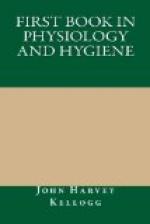6. Breath-Poisoned Air.—The most dangerous of all the poisons to which we are exposed through the air are those of the breath, of which we learned in a preceding lesson. We need plenty of fresh air to take the place of the air which we poison by our breath. Every time we breathe, we spoil at least half a barrelful of air. We breathe twenty times a minute, and hence spoil ten barrels of air in one minute. How many barrels would this make in one hour? We need an equal quantity of pure air to take the place of the spoiled air, or not less than ten barrels every minute, or six hundred barrels every hour.
7. Ventilation.—The only way to obtain the amount of fresh air needed, when we are shut up in-doors, is to have some means provided by which the fresh air shall be brought in and the old and impure air carried out. Changing the air by such means is called ventilation. Every house, and especially every sleeping-room, should be well ventilated. School-houses, churches, and other places where many people gather, need perfect ventilation. Ask your teacher to show you how the school-room is ventilated; and when you go home, talk to your parents about the ventilation of the house in which you live.
8. Many people ventilate their houses by opening the doors and windows. This is a very good way of ventilating a house in warm weather, but is a very poor way in cold weather, as it causes cold draughts, and makes the floor cold, so that it is difficult to keep the feet warm. It is much better to have the air warmed by a furnace or some similar means, before it enters the rooms. There ought also to be in each room a register to take the foul air out, so that it will not be necessary to open the windows. This register should be placed at the floor, because when the pure air enters the room warm, it first rises to the upper part of the room, and then as it cools and at the same time becomes impure, it settles to the floor, where it should be taken out by the register.
9. How to Breathe.—We should always take pains to expand the lungs well in breathing, and to use the entire chest, both the upper and the lower part. Clothing should be worn in such a way that every portion of the chest can be expanded. For this reason it is very wrong to wear the clothing tight about the waist. Clothing so worn is likely to cause the lungs to become diseased.
10. Bad Habits.—Students are very apt to make themselves flat-chested and round-shouldered by leaning over their desks while writing or studying. This is very harmful. We should always use great care to sit erect and to draw the shoulders well back. Then, if we take pains to fill the lungs well a great many times every day, we shall form the habit of expanding the lungs, and shall breathe deeper, even when we are not thinking about doing so.
11. Breathing through the Nose.—In breathing, we should always take care to draw the air in through the nose, and not through the mouth. The nose acts as a strainer, to remove particles of dust which might do harm if allowed to enter the lungs. It also warms and moistens the air in cold weather. The habit of breathing through the mouth often gives rise to serious disease of the throat and lungs.




